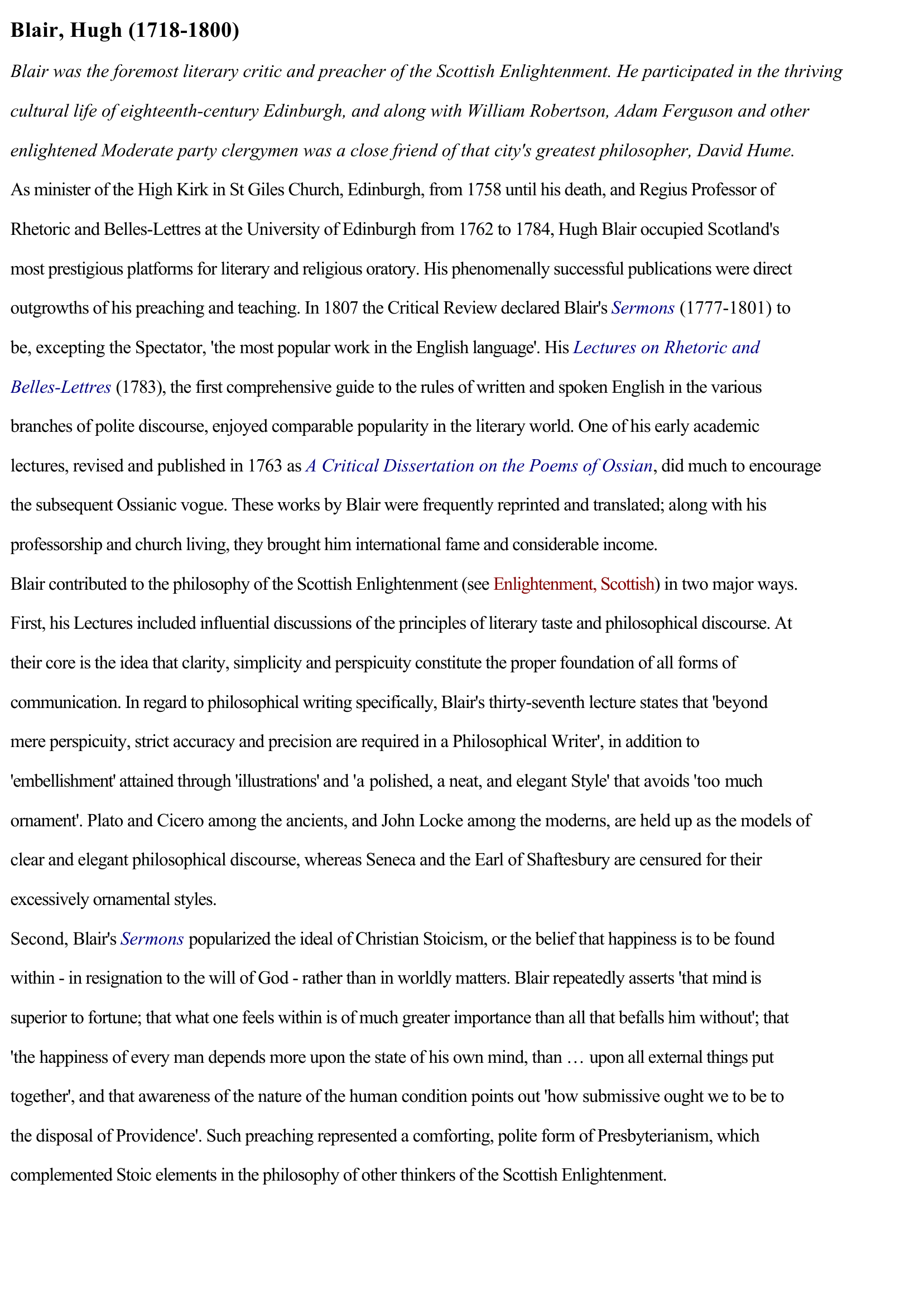Blair, Hugh
Publié le 16/05/2020

Extrait du document
«
Blair, Hugh (1718-1800)
Blair was the foremost literary critic and preacher of the Scottish Enlightenment.
He participated in the thriving
cultural life of eighteenth-century Edinburgh, and along with William Robertson, Adam Ferguson and other
enlightened Moderate party clergymen was a close friend of that city's greatest philosopher, David Hume.
As minister of the High Kirk in St Giles Church, Edinburgh, from 1758 until his death, and Regius Professor of
Rhetoric and Belles-Lettres at the University of Edinburgh from 1762 to 1784, Hugh Blair occupied Scotland's
most prestigious platforms for literary and religious oratory.
His phenomenally successful publications were direct
outgrowths of his preaching and teaching.
In 1807 the Critical Review declared Blair's Sermons (1777-1801) to
be, excepting the Spectator, 'the most popular work in the English language' .
His Lectures on Rhetoric and
Belles-Lettres (1783), the first comprehensive guide to the rules of written and spoken English in the various
branches of polite discourse, enjoyed comparable popularity in the literary world.
One of his early academic
lectures, revised and published in 1763 as A Critical Dissertation on the Poems of Ossian , did much to encourage
the subsequent Ossianic vogue.
These works by Blair were frequently reprinted and translated; along with his
professorship and church living, they brought him international fame and considerable income.
Blair contributed to the philosophy of the Scottish Enlightenment (see Enlightenment, Scottish ) in two major ways.
First, his Lectures included influential discussions of the principles of literary taste and philosophical discourse.
At
their core is the idea that clarity, simplicity and perspicuity constitute the proper foundation of all forms of
communication.
In regard to philosophical writing specifically, Blair's thirty-seventh lecture states that 'beyond
mere perspicuity, strict accuracy and precision are required in a Philosophical Writer' , in addition to
'embellishment' attained through 'illustrations' and 'a polished, a neat, and elegant Style' that avoids 'too much
ornament' .
Plato and Cicero among the ancients, and John Locke among the moderns, are held up as the models of
clear and elegant philosophical discourse, whereas Seneca and the Earl of Shaftesbury are censured for their
excessively ornamental styles.
Second, Blair's Sermons popularized the ideal of Christian Stoicism, or the belief that happiness is to be found
within - in resignation to the will of God - rather than in worldly matters.
Blair repeatedly asserts 'that mind is
superior to fortune; that what one feels within is of much greater importance than all that befalls him without'; that
'the happiness of every man depends more upon the state of his own mind, than … upon all external things put
together' , and that awareness of the nature of the human condition points out 'how submissive ought we to be to
the disposal of Providence' .
Such preaching represented a comforting, polite form of Presbyterianism, which
complemented Stoic elements in the philosophy of other thinkers of the Scottish Enlightenment..
»
↓↓↓ APERÇU DU DOCUMENT ↓↓↓
Liens utiles
- George Orwell (pseudonyme de Éric Blair)
- Port Blair.
- Blair, Tony
- George Orwell (pseudonyme de Éric Blair)1903-1950D'une intégrité aussi peu commune que commode, il occupait toujours, comme critique etcomme auteur de brochures politiques, des positions personnelles et provocantes.
- Wystan Hugh Auden1907-1973Né à York, fils d'un médecin et d'une mère très dévote, Auden apporta à la poésie anglaiseune sensibilité aiguë, angoissée, une haute intelligence et un don de synthèse exceptionnel,qui auraient pu laisser leur marque dans bien d'autres domaines.


